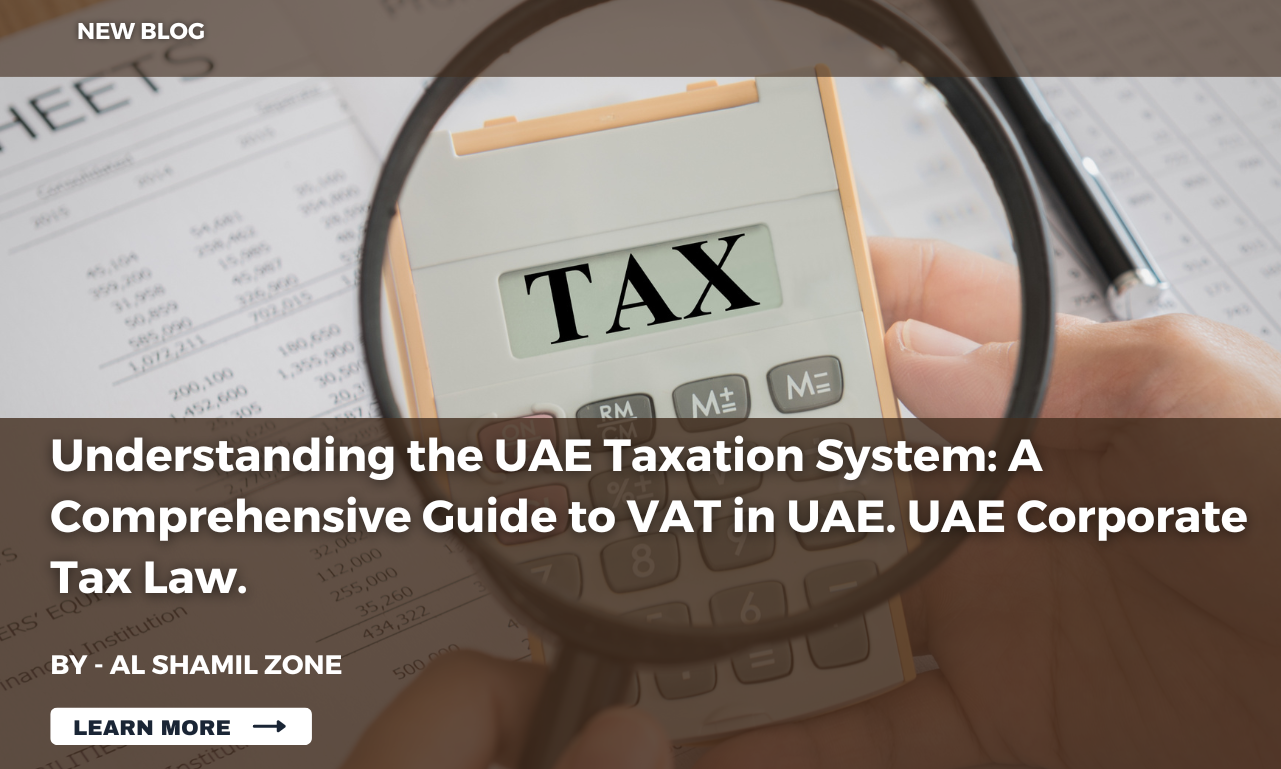Introduction to Taxation System in UAE
In this article, we're going to embark on a journey to discover the
mesmerizing field of Taxation in the UAE. UAE is Considered as a hub of
investment hub because of its strategic location, state of the art
infrastructure, and a group of other attractive features, one characteristic
that sets the UAE apart is its unique taxation structure.
Overview & Purpose of Implementing of the UAE Taxation System
The taxation system in the UAE is direct and different from many other
parts of the world. Its key unique attribute is that it does not impose any
corporate tax on companies and offers a tax-free salary to workers.
The UAE introduced tax to expand its revenue sources and lessen the
dependence on oil. With fluctuating prices of oil, the government
prophesied the need for a more stable income source, which led to the
introduction of VAT.
Different Types of Tax in UAE
The taxes in the UAE mainly revolve around VAT, customs duty and excise
tax. There is no income tax for individuals or corporate tax, except for oil
and banking sectors and branches of foreign banks.
Decoding the UAE VAT System: Basics and Overview
VAT system is possibly one of the most rousing parts of the UAE tax
scene. Introduced in 2018, the UAE VAT system has made a momentous
contribution to the local economy.
Definition of VAT
VAT or Value Added Tax is a consumption tax that is added to the cost of
goods or services at every stage of the supply chain, from production to the
point of sale.
Importance of VAT in UAE's Economic Structure
VAT ensures that everyone play a part in UAE's development, thus
retaining the quality of public services. It also indorses transparency and
compliance in businesses.
How VAT Works: An Overview
VAT is generally charged on the sale of goods and services, with
businesses acting as government tax collection agent. Businesses add
VAT to the price of the product or service, and customers pay this.
Businesses then deduct VAT incurred on costs and pay the balance to the
government.
Delving Deeper: Working of VAT in the UAE
In this section, we get down to the nitty-gritty of the VAT system in UAE by
understanding the calculations, the role of zero-rated and exempt goods,
and details about registration.
In the UAE, VAT is imposed at a standard rate of 5%, which is low in
comparison to global standards. This rate is applied to the sale price of
goods and services.
Some specific goods and services come under zero-rated or exempt
categories, which means they either attract 0% VAT or are excluded from
VAT, respectively. The former comprises basic food items and exports,
while the latter comprises certain financial services and residential real
estate.
Registration Procedures for VAT in UAE
Any business supplying taxable goods or services with an annual revenue
exceeding AED 375,000 should mandatorily register for VAT. Those with
revenue between AED 187,500 and AED 375,000 can voluntarily register.
Comprehensive Understanding of Key Regulations and Exemptions
As with any taxation system, UAE's VAT system also comes with its
regulations, penalties, and exemptions. Let's probe into these.
The VAT laws are clear and transparent in the UAE. They outline all
conditions for VAT, including penalties for non-compliance. These
regulations also detail the filing procedures and timelines.
Exemptions and zero-rated items serve to lessen the tax burden on
necessary items. These embrace basic food items, healthcare, education,
residential real estate, and some financial services.
Penalties and Fines Related to VAT in UAE
Several penalties can arise from non-compliance, such as non-registration,
late submissions of returns, or non-payment of due tax. They can vary from
monetary fines to imprisonment.
VAT Impact on Businesses and Consumers in the UAE
The impact of VAT can be far-reaching for both businesses and
consumers, both small and large-scale. And households? They're equally
affected.
VAT has required businesses to maintain proper accounting records, thus
bringing more legality and transparency to their operations. Though, the
cost of compliance might seem heavy to some small businesses.
For large businesses, complying with VAT can be beneficial in the long run.
It provides clear procurement and supply chain plans. However, these
corporations have needed to invest considerably in technology and
resources to incorporate VAT into their accounting systems.
For consumers, the immediate effect was the slight increase in the cost of
living due to the addition of VAT to most goods and services. However, it
also meant an improved quality of services rendered by public facilities.
Ensuring VAT Compliance: Tips and Strategies
Implementing a secure VAT infrastructure, ensuring proper record-keeping,
and training your staff are key steps towards VAT compliance. Hiring a tax
consultant can also be beneficial.
By dealing with VAT audit, you should have all records easily accessible.
Accuracy of input tax claims and correct calculation of output tax will also
be checked.
The Absence of Corporate Tax: A Comprehensive Insight
Now, let's shift gears and talk about another unique feature of the UAE
taxation system—to be specific, the lack of corporate tax.
With the exception of oil companies and branches of foreign banks, there
are no corporate taxes on companies in the UAE.
Factors Contributing to the No-Corporate-Tax Policy
This policy is designed to boost investment, encourage job creation, and
promote economic growth in the nation.
This policy has made the UAE a highly attractive investment destination,
drawing a broad spectrum of businesses and entrepreneurial ventures.
An In-depth Look at the Tax-Free Salary in UAE
Regarded an irresistible draw, the concept of a tax-free salary is another
standout element of the UAE's taxation landscape.
In the UAE, your salary goes entirely into your pocket; there are no
deductions for income tax.
While workers pocket their complete salary, there's a downside to this
boon: the absence of safety nets like pension benefits and social security.
For expatriates, the tax-free salary acts as a magnet, spurring a
cosmopolitan workforce and enabling a diverse business environment.
Future Projections and Updates on UAE's Tax Regulations
The UAE's taxation landscape is perpetually evolving, keeping pace with
global trends.
The government has hinted at broadening the VAT regime and possibly
reconsidering the no direct corporate tax policy, but only time will tell.
With an increased focus on transparency and governance, global changes
will affect how the UAE's tax system evolves.
How to Stay Informed and Prepared for Changes
Staying updated by checking government sites, attending tax seminars,
consulting tax advisors, and keeping an eye on the news can help you stay
ahead of any changes and adjustments.
Summary: Key Takeaways from UAE Taxation and VAT System
The journey of understanding the UAE Taxation system has been quite
informative, hasn't it?
We learned about the UAE's unique tax structure, including VAT and
its impact on businesses and consumers, the process of VAT
compliance, and the concept of a tax-free salary. The absence of
corporate tax, too, came under our scanner.
Our journey helped us understand how VAT works and how it's
calculated and implemented in the UAE. We also talked about the
exemptions and zero-rated items, and how businesses can foresee
and avoid common compliance mistakes.
The constant evolution of the UAE's taxation landscape reiterates the
need to stay updated and prepared. Remember, knowledge is power!
So there you have it - a comprehensive guide to understanding the UAE
taxation system! As you forge ahead, remember to keep an open mind,
stay informed, and embrace change as it comes. Happy taxation journey!
Frequently Asked Questions
Q. What are the consequences of failing to comply with VAT regulations?
A. Non-compliance can lead to penalties, fines, and in severe cases,
imprisonment.
Q. How does VAT impact the cost of living in the UAE?
A. The introduction of VAT led to a slight increase in the cost of living, as it
got added to most goods and services.
Q. Can businesses reclaim VAT, and how does the process work?
A. Yes, businesses can reclaim VAT incurred on business expenses and
costs. The reclaimed VAT is offset against VAT payable, and if the
reclaimed amount is higher, businesses can request a refund.
Q. Is there any corporate tax in the UAE?
A. There are no corporate taxes in the UAE, except on oil companies and
branches of foreign banks.
Q. Can taxation rules in the UAE change in future?
A. Yes, the tax rules can change as per global trends and economic
requirements.
Q. How does the absence of corporate tax impact foreign investments in
UAE?
A. The absence of corporate tax makes the UAE a preferred destination for
foreign investors.

Business Consultant ( Tagalog & English )
Khizia Marie
Online
Khizia Marie
Online

Business Consultant (English, Arabic, French)
Souad Birafane
Online
Souad Birafane
Online

Business Consultant (English, Urdu)
Syed Mehdi
Online
Syed Mehdi
Online

Business Consultant (English, Sinhalese)
Prasal Andaraweera
Online
Prasal Andaraweera
Online

Business Consultant (English, Urdu, Hindi)
Adnan Amin
Online
Adnan Amin
Online





















